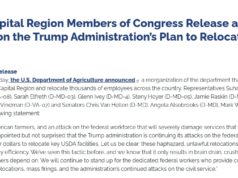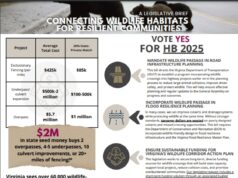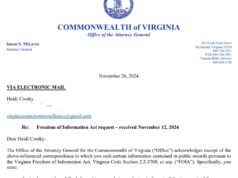See below for a press release from the Good Food Institute. For more background on this issue, see Virginia Republican Introduces Bill to Prohibit the Terms “Almond Milk,” “Soy Milk,” “Oat Milk,” etc.; and“Having a Cow” That Dairy-Industry-Backed Bill Barring use of “Milk” for Soy, Almond, Hemp, Flax, Oat, etc. Passed House of Delegates Committee.
Today, The Good Food Institute is calling on Virginia Governor Ralph Northam to veto the label censorship bill House Bill 119.
The Good Food Institute is calling on Virginia Governor Ralph Northam to veto the label censorship bill House Bill 119.
This bill attempts to ban all products from using the word “milk” unless it is “the lacteal secretion of a healthy hooved mammal.”
“If 11 other states pass similar legislation, consumers could no longer find labels like ‘soy milk,’ ‘almond milk,’ or ‘coconut milk’ on their supermarket shelves,’” explains GFI’s Regulatory Counsel Nigel Barrella. “Companies would be forced to choose between using opaque and confusing language like ‘coconut beverage’ and ‘almond juice,’ or pull out of the marketplace entirely, under the threat of fines or even jail time.”
“This type of bill is clearly a violation of the First Amendment,” notes GFI’s Director of Policy Jessica Almy. “A federal judge in Arkansas has already halted similar attempts at label censorship in that state.”
In addition to the Arkansas ruling, the Ninth Circuit has also rejected label censorship. In Painter v. Blue Diamond, the plaintiff accused Blue Diamond of fooling consumers because their product is labeled as “almond milk.” The court held that “no reasonable consumer could be misled by defendant’s unambiguous labeling or factually accurate nutrition statements.” The court continues, “by using the term ‘almond milk,’ even the least sophisticated consumer would know instantly what type of product they are purchasing.”
Similarly, when the maker of Silk plant-based milk was sued over their labels, the court found that the claim of deception “stretches the bounds of credulity” and that under the same logic, “a reasonable consumer might also believe that veggie bacon contains pork, that flourless chocolate cake contains flour, or that e-books are made out of paper.”
“In addition to being unconstitutional, this bill is redundant and unnecessary,” notes GFI Policy Coordinator Emily Hennessee. “The Federal Food, Drug, and Cosmetic Act already prohibits false or misleading labels. Thus, HB 119 does absolutely nothing to protect consumers. Instead, this bill would make it harder for plant-based milk companies to communicate clearly with their consumers.”
For more information, please contact GFI’s Director of Policy, Jessica Almy: jessicaa@gfi.org.
Media inquiries: Maia Keerie at The Good Food Institute on 415 767 8973 or via maiak@gfi.org
About The Good Food Institute
The Good Food Institute is a global nonprofit building a sustainable, healthy, and just food system. With unique insight across the scientific, regulatory, industry, and investment landscape, we are accelerating the transition of the world’s food system to alternative proteins using the power of food innovation and markets.














